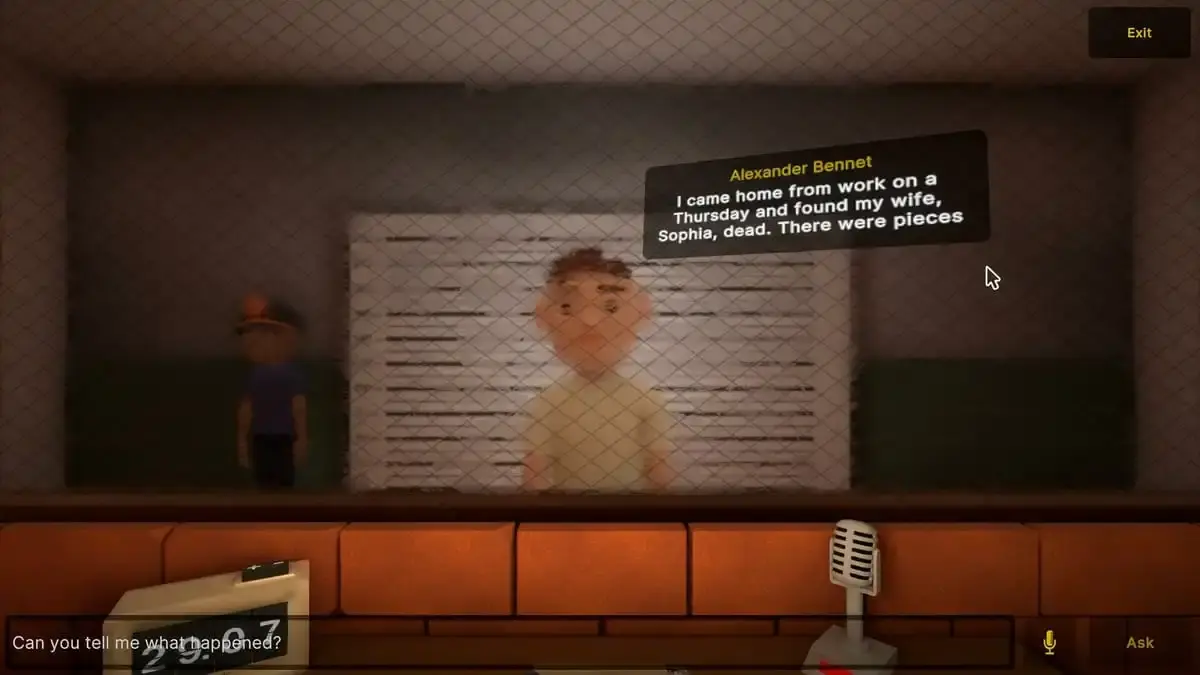- cross-posted to:
- gaming@lemmy.ml
- cross-posted to:
- gaming@lemmy.ml
Excerpts:
The Verbal Verdict demo drops me into an interrogation room with basic facts about the case to my left, and on the other side of a glass window are three suspects I can call one at a time for questioning. There are no prompts or briefings—I just have to start asking questions, either by typing them or speaking them into a microphone
The responses are mostly natural, and at times add just a bit more information for me to follow up on.
Mostly. Sometimes, the AI goes entirely off the rails and starts typing gibberish
There are, of course, still many limitations to this implementation of an LLM in a game. Kristelijn said that they are using a pretty “censored” model, and also adding their own restrictions, to make sure the LLM doesn’t say anything harmful. It also makes what should be a very small game much larger (the demo is more than 7GB), because it runs the model locally on your machine. Kristelijn said that running the model locally helps Savanna Developments with privacy concerns. If the LLM runs locally it doesn’t have to see or handle what players are typing. And it also is better for game preservation because if the game doesn’t need to connect to an online server it can keep running even if Savanna Developments shuts down.
it’s pretty hard to “write” different voices for them. They all kind of speak similarly. One character in the full version of the game, for example, speaks in short sentences to convey a certain attitude, but that doesn’t come close to the characterization you’d see in a game like L.A. Noire, where character dialogue is meticulously written to convey personality.



I don’t think we’ll see this any time soon, because corpos probably won’t listen to any creative that presents this, but I want something where the LLM runs locally and is just used to interpret what you are asking for but the dialogue responses are all still written by a writer. Then you can make the user interaction feel more intuitive, but the design of the story and mechanics can just respond to the implied tone, questions, prompts, keywords from the user.
Then you could have a dialogue tree that responds with a nice well constructed narrative, but a user who asked something casually vs accusatory might end up with slightly different information.
Unless you’re willing to put in some kind of response that basically says “I’m not going to respond to that” (and that’s a sure way to break immersion) this is effectively impossible to do well, because the writer has to anticipate every possible thing a player could say and craft a response to it. If you don’t, you’ll end up finding a “nearest fit” that is not at all what the player was trying to say, and the reaction is going to be nonsensical from the player’s perspective
LA Noire is a great example of this, although from the side of the player character: the dialogue was written with the “Doubt” option as “Press” (as in, put pressure on the other party). As a result, a suspect can say something, the player selects “Doubt”, and Phelps goes nuts making wild accusations instead of pointing out an inconsistency.
Except worse, because in this case, the player says something like “Why didn’t you say something to your boss about feeling sick?” and the game interpreted it as “Accuse them of trying to sabotage the business.”
Ooooh, I’d like that! Well, there’s 3 parts to the (random user input / scripted game output) conundrum: